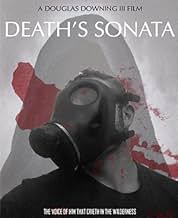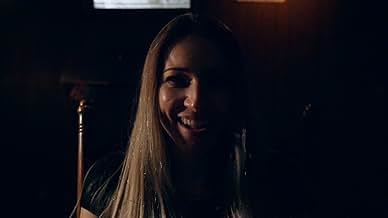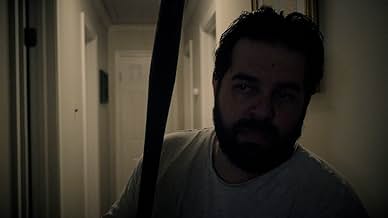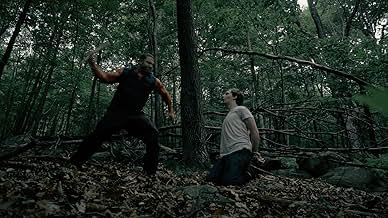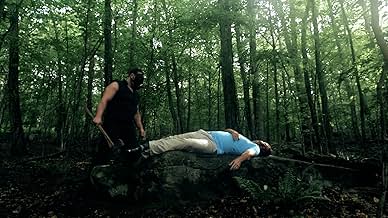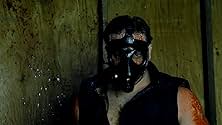The story of a man suffering from Schizophrenia and the psychotherapist who tries to find him with the help of his young Bi-Polar patient.The story of a man suffering from Schizophrenia and the psychotherapist who tries to find him with the help of his young Bi-Polar patient.The story of a man suffering from Schizophrenia and the psychotherapist who tries to find him with the help of his young Bi-Polar patient.
Dannah Kelly
- Mandy
- (as Dannah Basgall)
Featured reviews
Every now and then, a horror film slips through the cracks of the studio machine, drenched in grit, passion, and raw psychological terror. Death's Sonata is one of those rare indie slasher gems that deserves to be whispered about at midnight horror marathons and scribbled onto bathroom stalls in red ink.
Directed with a veteran's eye by Douglas Downing III, this is not your typical body count flick. Sure, there are kills - brutal, deliberate ones - but this isn't about gore for gore's sake. This is about decay. Of the mind, of morality, of a man's grip on reality. And it's horrifying.
Dr. William Fredrickson (played with haunting restraint by Morrison James) isn't your Final Guy or your masked avenger. He's a seasoned shrink clinging to reason as his greatest failure - Charles - slips deeper into madness. Charles is no ordinary killer. He's a schizophrenic outcast who's literally being compelled by Death, the Grim Reaper himself. Whether that's metaphor or manifestation is up for debate, and the film never spoon-feeds you an answer. That's what makes it brilliant.
What Death's Sonata does so well is blend psychological horror with slasher mechanics. It creeps rather than sprints. The woods feel claustrophobic, the hunting cabin like a tomb waiting to be filled. There's a mythic, almost religious undertone - Death isn't just a figure in black; he's a judge, jury, and executioner, and Charles is his trembling scribe.
But don't worry, gorehounds - you'll get your fix. The kills, when they come, are vicious, intimate, and full of dread. No over-the-top chainsaws or cheesy one-liners. This is murder with meaning.
And then there's Matthew - the wildcard. A manic-depressive patient sent to hunt another. His descent into the woods feels like Apocalypse Now through a Friday the 13th lens. By the time the police get involved, it's less about law and more about damage control. There's no justice here - only consequences.
The score is minimalist but bone-chilling. The cinematography has that grimy '70s edge we all crave - think The Prowler meets Session 9. And the pacing, while slow at first, is purposeful. This is a story about erosion - of sanity, of safety, of salvation.
In the end its a chilling, cerebral slasher with a heart full of darkness. If Henry: Portrait of a Serial Killer and The Babadook had a backwoods baby raised on Phantasm and The Seventh Seal, this would be it.
Directed with a veteran's eye by Douglas Downing III, this is not your typical body count flick. Sure, there are kills - brutal, deliberate ones - but this isn't about gore for gore's sake. This is about decay. Of the mind, of morality, of a man's grip on reality. And it's horrifying.
Dr. William Fredrickson (played with haunting restraint by Morrison James) isn't your Final Guy or your masked avenger. He's a seasoned shrink clinging to reason as his greatest failure - Charles - slips deeper into madness. Charles is no ordinary killer. He's a schizophrenic outcast who's literally being compelled by Death, the Grim Reaper himself. Whether that's metaphor or manifestation is up for debate, and the film never spoon-feeds you an answer. That's what makes it brilliant.
What Death's Sonata does so well is blend psychological horror with slasher mechanics. It creeps rather than sprints. The woods feel claustrophobic, the hunting cabin like a tomb waiting to be filled. There's a mythic, almost religious undertone - Death isn't just a figure in black; he's a judge, jury, and executioner, and Charles is his trembling scribe.
But don't worry, gorehounds - you'll get your fix. The kills, when they come, are vicious, intimate, and full of dread. No over-the-top chainsaws or cheesy one-liners. This is murder with meaning.
And then there's Matthew - the wildcard. A manic-depressive patient sent to hunt another. His descent into the woods feels like Apocalypse Now through a Friday the 13th lens. By the time the police get involved, it's less about law and more about damage control. There's no justice here - only consequences.
The score is minimalist but bone-chilling. The cinematography has that grimy '70s edge we all crave - think The Prowler meets Session 9. And the pacing, while slow at first, is purposeful. This is a story about erosion - of sanity, of safety, of salvation.
In the end its a chilling, cerebral slasher with a heart full of darkness. If Henry: Portrait of a Serial Killer and The Babadook had a backwoods baby raised on Phantasm and The Seventh Seal, this would be it.
This film surprised me. It's flawed, yeah, but when it goes for it-it really goes for it. The violence hits hard, not just for shock value, but because it means something in the story. The payoff in a few of those scenes was brutal in the best way. You feel the weight of it. What holds it back is consistency. Some transitions felt jarring, a few scenes drag, and there are definitely moments where the momentum dips. But it always picks back up, usually with something that punches you in the gut-visually or emotionally. What I appreciated most is that it doesn't hold your hand. It assumes you're paying attention, and it's not afraid to be ugly or uncomfortable. That takes guts. It's not polished, but it's personal. You can feel that.
Death's Sonata is a good indie horror film-not perfect, but definitely one of the more engaging low-budget Horrors I've seen in a while. It has a few standout kills and some solid atmosphere, but what really surprised me was the acting. For an indie, the performances are strong across the board, with a cast that clearly commits to the material.
The biggest standout is Dr. Fredrickson. He's chilling-more evil, in many ways, than the masked killer stalking the characters. There's a coldness to him that really creeps under your skin. He's not your typical horror villain. Instead of brute force, his evil comes from a calm, manipulative intellect, which makes him all the more unsettling.
What really held my attention was the story. Indie horror films often fall into the trap of being all style and no substance, but this one kept me intrigued from start to finish. The plot centers around a therapist who's hunting for the one patient he failed, and in doing so, he's sending his current, weaker patients to their deaths-almost like they're bait or tools to reach a final objective. It's a disturbing concept, and it adds a layer of psychological horror that goes beyond just blood and gore.
There are still a few rough edges-some scenes could've used tighter editing or a bit more budget to fully land-but overall, Death's Sonata punches above its weight. If you're into horror that blends slasher violence with psychological depth, it's definitely worth checking out.
The biggest standout is Dr. Fredrickson. He's chilling-more evil, in many ways, than the masked killer stalking the characters. There's a coldness to him that really creeps under your skin. He's not your typical horror villain. Instead of brute force, his evil comes from a calm, manipulative intellect, which makes him all the more unsettling.
What really held my attention was the story. Indie horror films often fall into the trap of being all style and no substance, but this one kept me intrigued from start to finish. The plot centers around a therapist who's hunting for the one patient he failed, and in doing so, he's sending his current, weaker patients to their deaths-almost like they're bait or tools to reach a final objective. It's a disturbing concept, and it adds a layer of psychological horror that goes beyond just blood and gore.
There are still a few rough edges-some scenes could've used tighter editing or a bit more budget to fully land-but overall, Death's Sonata punches above its weight. If you're into horror that blends slasher violence with psychological depth, it's definitely worth checking out.
Okay, so I went into Death's Sonata expecting another backyard slasher with a spooky mask and dollar store blood. What I got instead? A gutted hymn of madness that crawled under my skin and stayed there.
Let's talk Charles. He's not your average slasher freak in a mask-he's like if Phantom of the Opera had unresolved trauma, a murder streak, and a funeral playlist stuck on repeat. The guy doesn't stalk... he suffers. And somehow, watching him fall apart while ripping people to shreds feels weirdly tragic. I didn't want to root for him, but halfway through, I was like, "Yeah, stab that guy. He kinda deserves it."
The kills are rough, personal, and almost too close for comfort. No flashy camera spins, no corny one-liners. Just raw violence that feels like it's happening down the block from you. And the score? It's like someone dug up an old church organ, possessed it, and made it weep blood. At first, it's distracting. Then it's unsettling. Then it's perfect.
Is it flawless? Hell no. Some scenes wobble, the budget bleeds through here and there, and a few side characters feel like they wandered in from a community theater production of CSI: Albany. But it never loses that grit. That pulse. That indie horror rage.
Bottom line: Death's Sonata doesn't ask you to like it. It dares you to sit with it. And if you do? You'll leave feeling a little haunted... and maybe a little dirty.
Score: 7.5 out of 10 Watch it if: You like your slashers bruised, bleeding, and barely holding it together.
Avoid it if: You need your horror spoon-fed and squeaky clean.
Let's talk Charles. He's not your average slasher freak in a mask-he's like if Phantom of the Opera had unresolved trauma, a murder streak, and a funeral playlist stuck on repeat. The guy doesn't stalk... he suffers. And somehow, watching him fall apart while ripping people to shreds feels weirdly tragic. I didn't want to root for him, but halfway through, I was like, "Yeah, stab that guy. He kinda deserves it."
The kills are rough, personal, and almost too close for comfort. No flashy camera spins, no corny one-liners. Just raw violence that feels like it's happening down the block from you. And the score? It's like someone dug up an old church organ, possessed it, and made it weep blood. At first, it's distracting. Then it's unsettling. Then it's perfect.
Is it flawless? Hell no. Some scenes wobble, the budget bleeds through here and there, and a few side characters feel like they wandered in from a community theater production of CSI: Albany. But it never loses that grit. That pulse. That indie horror rage.
Bottom line: Death's Sonata doesn't ask you to like it. It dares you to sit with it. And if you do? You'll leave feeling a little haunted... and maybe a little dirty.
Score: 7.5 out of 10 Watch it if: You like your slashers bruised, bleeding, and barely holding it together.
Avoid it if: You need your horror spoon-fed and squeaky clean.
I had the pleasure of stumbling upon Death's Sonata at the Horrorfest in Stamford, Connecticut, and I can confidently say it's one of the most compelling indie horror films I've seen in years.
Directed by Douglas Downing III, Death's Sonata is a slow-burning nightmare that fuses religious dread, psychological torment, and slasher terror into something wholly its own. From the first unsettling frame to the haunting final shot, the film grips you with a sense of cinematic confidence that's rare in low-budget horror.
The atmosphere is relentless - cold, quiet, and deeply foreboding. The masked killer at the center of the story is iconic in presence, echoing the menace of Michael Myers but layered with something more cultic and metaphysical. The score, sharp and eerie like the title suggests, guides the dread rather than overpowers it, enhancing the tension without feeling cliché.
It blends classic horror aesthetics with modern, grounded violence. There's a maturity to the way the film is paced, building horror through silence, shadow, and suggestion rather than jump scares.
Sure, the budget shows in places, but that's part of the charm. This is grassroots horror done right - gritty, passionate, and unflinching. Death's Sonata proves that indie horror is alive and well!
Directed by Douglas Downing III, Death's Sonata is a slow-burning nightmare that fuses religious dread, psychological torment, and slasher terror into something wholly its own. From the first unsettling frame to the haunting final shot, the film grips you with a sense of cinematic confidence that's rare in low-budget horror.
The atmosphere is relentless - cold, quiet, and deeply foreboding. The masked killer at the center of the story is iconic in presence, echoing the menace of Michael Myers but layered with something more cultic and metaphysical. The score, sharp and eerie like the title suggests, guides the dread rather than overpowers it, enhancing the tension without feeling cliché.
It blends classic horror aesthetics with modern, grounded violence. There's a maturity to the way the film is paced, building horror through silence, shadow, and suggestion rather than jump scares.
Sure, the budget shows in places, but that's part of the charm. This is grassroots horror done right - gritty, passionate, and unflinching. Death's Sonata proves that indie horror is alive and well!
Details
- Runtime
- 1h 43m(103 min)
- Color
Contribute to this page
Suggest an edit or add missing content


